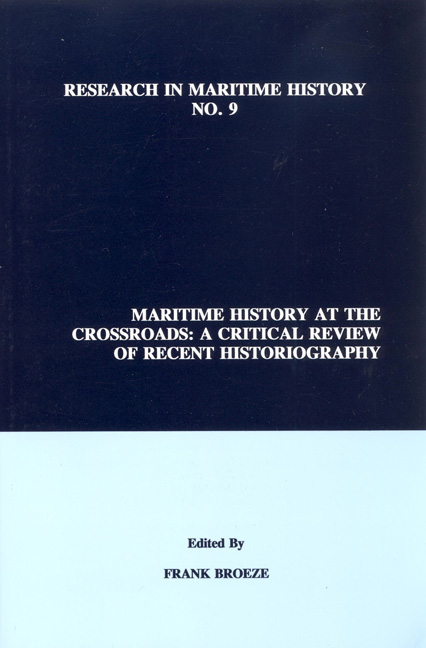Book contents
- Frontmatter
- Contents
- About the Editor
- Introduction
- Contributors
- “Maritime History in Australia”
- “The Enterprising Canadians: An Assessment of Canadian Maritime History since 1975”
- “The Historiography of Maritime China since c. 1975”
- “Danish Maritime History, 1976-1992: A Review”
- “German Maritime Historical Research since 1970: A Critical Survey”
- “The Maritime Historiography of Greece in Recent Decades”
- “Ibero-American Maritime History: Recent Advances in Research, 1975-1994”
- “Indian Maritime Historiography: West Coast Merchants in a Globalizing Economy”
- “Recent Developments in the Historiography of Maritime History in the Netherlands”
- “The Ottoman Empire: Recent Research on Shipping and Shipbuilding in the Sixteenth to Nineteenth Centuries”
- “The Progress of Maritime History in Spain since 1975”
- “Oceanic Historiography: The American Dimension”
“Recent Developments in the Historiography of Maritime History in the Netherlands”
from Contributors
- Frontmatter
- Contents
- About the Editor
- Introduction
- Contributors
- “Maritime History in Australia”
- “The Enterprising Canadians: An Assessment of Canadian Maritime History since 1975”
- “The Historiography of Maritime China since c. 1975”
- “Danish Maritime History, 1976-1992: A Review”
- “German Maritime Historical Research since 1970: A Critical Survey”
- “The Maritime Historiography of Greece in Recent Decades”
- “Ibero-American Maritime History: Recent Advances in Research, 1975-1994”
- “Indian Maritime Historiography: West Coast Merchants in a Globalizing Economy”
- “Recent Developments in the Historiography of Maritime History in the Netherlands”
- “The Ottoman Empire: Recent Research on Shipping and Shipbuilding in the Sixteenth to Nineteenth Centuries”
- “The Progress of Maritime History in Spain since 1975”
- “Oceanic Historiography: The American Dimension”
Summary
No one can argue that maritime historians do not produce a large number of books, articles and reports. An extensive bibliography, published twice yearly in the Dutch Tijdschrift voor Zeegeschiedenis, listed 19,284 titles between 1978 and 1994, an annual output of more than 1000 studies. Global production is much larger, for the compilor of this bibliography is dependent on the availability of foreign journals in the Netherlands and his overseas informants. Despite such limitations the Dutch maritime historian is faced with a daunting number of publications. His or her own contribution is also likely to be substantial, since Dutch historians are prominent in nearly all sections of the bibliography, from publications on navies and merchant shipping to maritime labour, ships and shipbuilding, whaling and fishing, ports and seaways, law of the sea, navigation, cartography, maritime archaeology, yachting, and several minor subjects. The multifaceted maritime history of the Netherlands provides material for all these topics and today has students in respectable numbers. But this was not the case in the early 1970s.
A Fresh Start in the 1970s
Although the days when naval campaigns and discoveries were the most favoured topics in maritime history had already ended, a Commission of the Royal Academy of Sciences in a 1972 report on the status of historical research in the Netherlands still made a distinction between maritime and naval history. Since this division was not functional and served no purpose, it is not surprising that it disappeared in later years. Shortly after this report was published a number of developments occurred which confirmed that “sea” history was a natural entity and led to the take-off to the present healthy state of the art. The conception, writing and publication of a four-volume Maritieme Geschiedenis der Nederlanden between 1974 and 1978 was probably the most important development. Each volume had the same structure, and the dividing lines for periods were innovative and did not correspond to traditional turning points: c. 1585, c. 1680, and c. 1850-1870. The approach was thematic. Each volume began with chapters on ships and shipbuilding, ports, shipowning, seafarers and navigation. Next came “operational” chapters on the five different branches of Dutch seafaring: the mercantile marine inside and outside Europe (mainly in Asia and the Americas), fishing, whaling and the navy. An annotated bibliography was added to each chapter.
- Type
- Chapter
- Information
- Maritime History at the CrossroadsA Critical Review of Recent Historiography, pp. 193 - 212Publisher: Liverpool University PressPrint publication year: 1995



